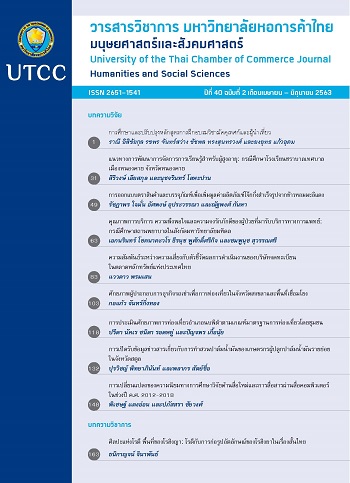Assessment of the Tourism Potential of Nopphitam District Based on Community-Based Tourism Standard
Main Article Content
Abstract
This mixed research aimed 1) to identify and assess the tourism potential of Nopphitam District in Nakhon Si Thammarat Province, and 2) to examine the upgradability of community-based tourism in the case study of Baan Na-ngae, Nopphitam District. The data collection was carried out through an in-depth interview, a group discussion and a participant observation by relevant stakeholders such as, heads of community, tourism and community’s entrepreneurs. In the time, quantitative method, mean statistics applied with the five aspects in potential of community-based tourism standard. The results showed that the overall tourism potential was outstanding in its sustainable and systematic management of natural resources and environment, with the highest rated score of 3.09, followed by the quality of community-based tourism service (2.49), and the management of socio-economic development and quality of life (2.30), the community cultural conservation and support (2.07), whereas the management of community-based tourism gained the lowest score (1.90). In addition, current tourism potential has not yet to have formalized community-based management. However, the community is considered potential in moving forward better tourism through key community capitals at hand including social and culture capital, wisdom capital, natural resource capital and economic capital.
Article Details
ลิขสิทธิ์ของบทความ
ผลงานที่ได้รับการตีพิมพ์ถือเป็นลิขสิทธิ์ของมหาวิทยาลัยหอการค้าไทย ห้ามมิให้นำเนื้อหา ทัศนะ หรือข้อคิดเห็นใด ๆ ของผลงานไปทำซ้ำ ดัดแปลง หรือเผยแพร่ ไม่ว่าทั้งหมดหรือบางส่วนโดยไม่ได้รับอนุญาตเป็นลายลักษณ์อักษรจากมหาวิทยาลัยหอการค้าไทยก่อน
References
กัลยา สว่างคง. (2558). การประเมินศักยภาพแหล่งท่องเที่ยวในมุมมองของนักท่องเที่ยวกรณีศึกษาแหล่งท่องเที่ยวประเภทน้ำตกในจังหวัดสระบุรี. วารสารสังคมศาสตร์ มหาวิทยาลัยศรีนครินทรวิโรฒ, 18(18), 10-25.
ฆณรุจ มิ่งเมธาพร, กฤศดา ธีราทิตยกุล, และวรพงษ์ ผูกภู่. (2557). การศึกษาสถานการณ์การท่องเที่ยวโดยชุมชนและแนวทางการผลักดันให้มาตรฐานการท่องเที่ยวโดยชุมชนได้รับการบรรจุเข้าเป็นมาตรฐานระดับชาติ กรณีศึกษาประเทศไทย (โครงการวิจัยย่อยที่ 1). กรุงเทพฯ: สำนักงานคณะกรรมการวิจัยแห่งชาติ.
ณัฏฐพัชร มณีโรจน์. (2560). การจัดการการท่องเที่ยวโดยชุมชน. วารสารวิชาการการท่องเที่ยวไทยนานาชาติ, 13(2), 25-48.
ณัฏฐินี ทองดี. (2562). การเพิ่มคุณค่าด้านทรัพยากรมนุษย์. ใน กรมการท่องเที่ยว, คู่มือพัฒนาศักยภาพบุคลากรด้านการท่องเที่ยวในชุมชน (น. 17-29). นครราชสีมา: ปาร์ตี้ บูม.
ใบเฟิร์น วงษ์บัวงาม, และมุขสุดา พูลสวัสดิ์. (2556). การประเมินศักยภาพแหล่งท่องเที่ยวเชิงเกษตรโครงการที่ได้รับรางวัลจากการประกวดผลงานตามปรัชญาของเศรษฐกิจพอเพียงภาคการเกษตรในเขตกรุงเทพและปริมณฑล. กรุงเทพฯ: มหาวิทยาลัยเทคโนโลยีราชมงคลพระนคร.
พจนา สวนศรี, และสมภพ ยี่จอหอ. (2556). คู่มือมาตรฐานการท่องเที่ยวโดยชุมชน. เชียงใหม่: มหาวิทยาลัยพายัพ, สถาบันการท่องเที่ยวโดยชุมชน.
ฟ้าพิไล ทวีสินโสภา, กิตติศักดิ์ ทวีสินโสภา, และเพ็ญพร เกิดสุข. (2558). นวัตกรรมการท่องเที่ยวเพื่อการจัดการท่องเที่ยวทางทะเลตรัง: กรณีศึกษา เกาะม้า เกาะกระดาน เกาะมุก และเกาะเชือก. ใน การประชุมวิชาการด้านการจัดการระดับชาติ วลัยลักษณ์วิจัยทางการจัดการ ครั้งที่ 4 (น. 87-99). นครศรีธรรมราช: มหาวิทยาลัยวลัยลักษณ์.
วันวิสาข์ ธรรมวิชา. (2562). การบริหารจัดการเงินทุนและรายได้จากการท่องเที่ยว. ใน กรมการท่องเที่ยว, คู่มือพัฒนาศักยภาพบุคลากรด้านการท่องเที่ยวในชุมชน (น. 9-18). นครราชสีมา: ปาร์ตี้ บูม.
Dodds, R., Ali, A., & Galaski, K. (2018). Mobilizing knowledge: Determining key elements for success and pitfalls in developing community-based tourism. Current Issues in Tourism, 21, 1547-1568.
Ruiz-Ballesteros, E. (2011). Social-ecological resilience and community-based tourism: An approach from Agua Blanca, Ecuador. Tourism Management, 32, 655-666.
Spenceley, A. (2008). Local impacts of community-based tourism in Southern Africa. In A. Spenceley (Ed.), Responsible tourism: Critical issues for conservation and development (pp.285-303). London: Earthscan.
Stone., L., & Stone, T. (2011). Community- based tourism enterprises: Challenges and prospects for community participation; Khama Rhino Sanctuary Trust, Botswana. Journal of Sustainable Tourism, 19(1), 97-114.
Zielinski, S., Kim, S., Botero, C., & Yanes, A. (2020). Factors that facilitate and inhibit community-based tourism initiatives in developing countries. Current Issues in Tourism, 23(6), 1-17.


